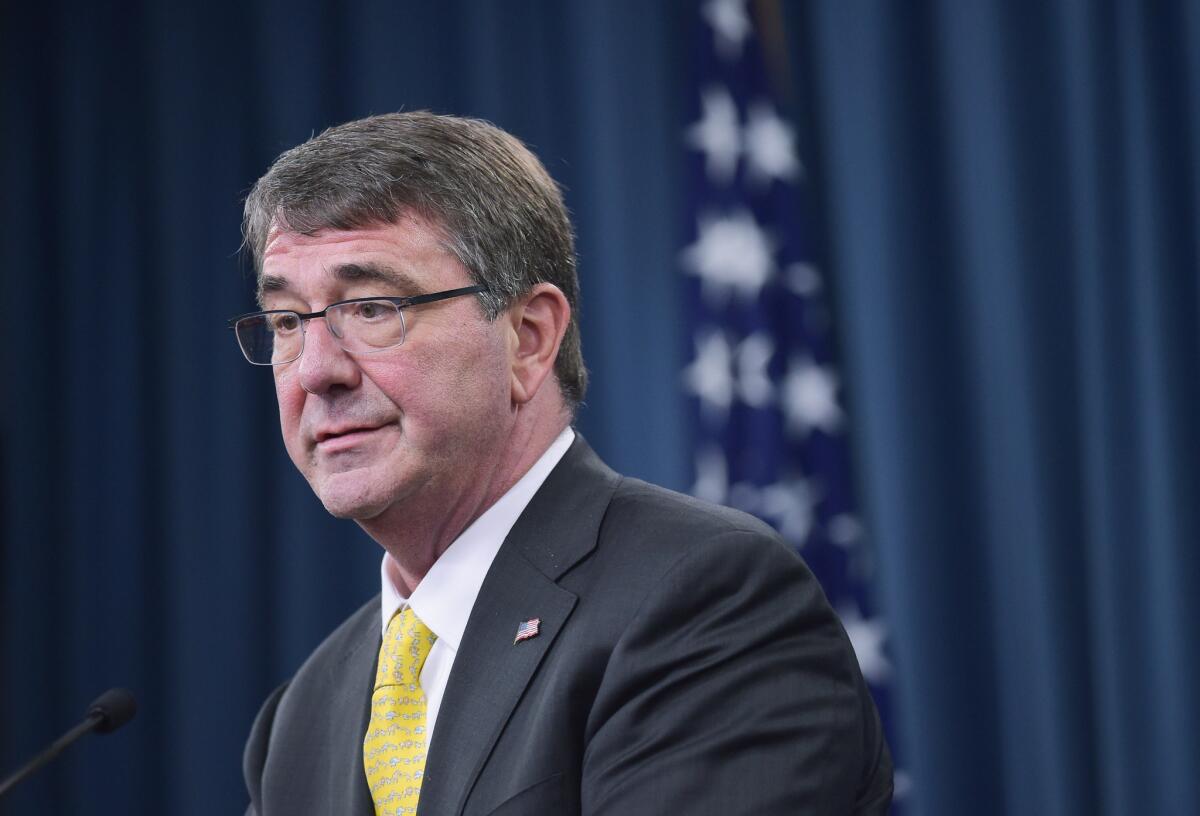Pentagon chief: Iraqis must have ‘will to fight’ to defeat Islamic State

Secretary of Defense Ashton Carter, shown speaking earlier this month at the Pentagon, said Sunday that Iraqis must have the “will to fight” to defeat the Islamic State militants.
- Share via
Reporting from Washington — The Obama administration intensified its defense of the president’s strategy against Islamic State militants Sunday, with Secretary of Defense Ashton Carter making a vigorous case that the terrorist group can only be defeated if the Iraqis “develop the will to fight.”
In the wake of Islamic State victories in the Iraqi city of Ramadi and in the ancient Syrian city of Palmyra last week, Carter fended off suggestions that it’s time to position U.S. ground troops and troop air controllers near the trouble spots in an effort to contain the Islamic State.
Local officials and fighters must take responsibility, he said.
“They are the ones that have to beat ISIL and keep them beat,” Carter said on CNN’s “State of the Union,” using an alternate acronym for the group. “We can participate in the defeat of ISIL but we can’t make Iraq run as a decent place for people to live. We can’t sustain the victory; only the Iraqis can do that.”
The U.S. role in the turbulent region might change at some point, Carter acknowledged, suggesting he would remain open to recommending a change in strategy.
But the fall of Ramadi, the capital of Anbar province, points to a need for the U.S. to help improve the Iraqis’ equipment and training while “encouraging their will to fight so that our campaign enabling them can be successful.”
The interview showed the Pentagon chief in full embrace of President Obama’s view that the U.S. can help fight the Islamic State, but that local forces must lead the fight against its brutal campaign in Iraq and Syria.
In recent days, Republicans have raised questions about the effectiveness of the direction Obama is giving his military and about whether U.S. commanders on the ground are adequately empowered in the discussions.
Sen. John McCain (R-Ariz.) expressed the frustrations of several colleagues on Sunday when he complained that Obama hasn’t outlined a clear path to containing the militants as they try to set up an Islamic caliphate in the region.
“There is no strategy,” McCain told Bob Schieffer on CBS’ “Face the Nation.” “And anybody that says that there is I’d like to hear what it is. Because it certainly isn’t apparent now.”
Obama’s decision to pull troops out of Iraq after years of war was the wrong call, he said, arguing that the effectiveness of the 2007 surge of military troops in Iraq was dismantled when Obama withdrew ground troops from Iraq.
“We had before the Senate Armed Services Committee this week two architects of the surge that won,” said McCain, the chair of that committee. “And we did have it won, until the decision was made to withdraw all troops.”
Hakim Zamili, the head of Iraq’s parliamentary defense and security committee, disagreed with the U.S. on why Ramadi was lost. The U.S. failed to give “good equipment, weapons and aerial support” at Ramadi and is now seeking to “throw the blame on somebody else,” he told the Associated Press.
Carter argued that the Iraqis lost a fight where they “vastly outnumbered the opposing force.”
They “failed to fight and withdrew from the site,” he said. “That says to me, and I think to most of us, that we have an issue with the will of the Iraqis to fight ISIL and defend themselves. Now we can give them training, we can give them equipment, we obviously can’t give them the will to fight.”
“Only if they fight,” he said, “can ISIL remain defeated.”
For news about President Obama and the Obama administration, follow me on Twitter: @cparsons
More to Read
Sign up for Essential California
The most important California stories and recommendations in your inbox every morning.
You may occasionally receive promotional content from the Los Angeles Times.













